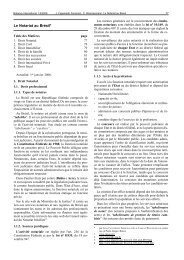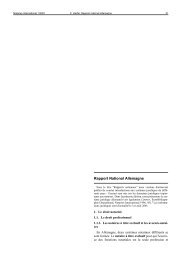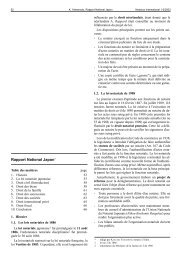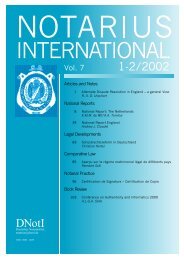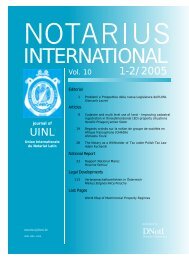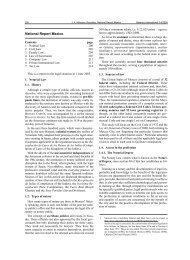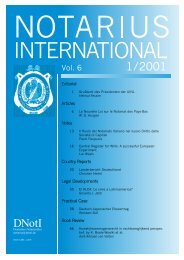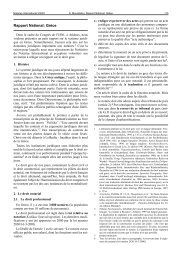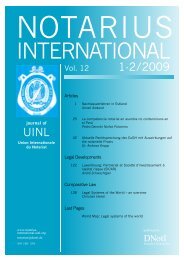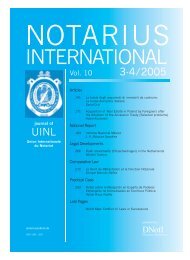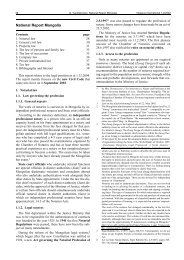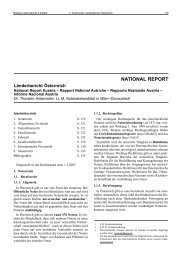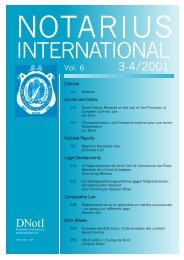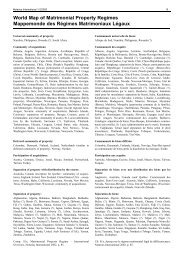ARTICLES and NOTES - Notarius International
ARTICLES and NOTES - Notarius International
ARTICLES and NOTES - Notarius International
You also want an ePaper? Increase the reach of your titles
YUMPU automatically turns print PDFs into web optimized ePapers that Google loves.
238 O. Soergel/O. Stöcker, EU Enlargement <strong>and</strong> Property Law <strong>Notarius</strong> <strong>International</strong> 3-4/2002<br />
The so-called Auflassung (conveyance) under German<br />
law – the agreement between the transferor of the real<br />
property <strong>and</strong> the transferee of the real property with regard<br />
to the transfer of title – (§ 925 (1) (1) BGB) – comes<br />
within the second category of contracts.<br />
In Example 2 therefore if one applies the principle of<br />
separation (Trennungsprinzip) in relation to the provision<br />
of security, the position is that in an initial contract (the<br />
loan contract <strong>and</strong> indeed in the provisions in it regarding<br />
the security to be provided by the borrower) the obligation<br />
of the borrower to provide the security is established<br />
inter partes. This first contract is therefore the causa of<br />
what is effected in the later, second contract; <strong>and</strong> in this<br />
second contract (the contract in rem for the provision of<br />
security) the lender is provided with the security interest<br />
with erga omnes effect <strong>and</strong> the obligation of the borrower<br />
to provide the security is satisfied at the same time.<br />
Diagram 2: Principle of Separation (Trennungsprinzip)<br />
in relation to security over real property<br />
2.3. Causality <strong>and</strong> Abstraction<br />
If one follows the principle of separation (Trennungsprinzip),<br />
then the relationship between these two – separate<br />
– contracts of obligation <strong>and</strong> performance (Verpflichtungsgeschäft<br />
– Erfüllungsgeschäft) has to be clarified.<br />
The pair of concepts causality <strong>and</strong> abstraction (Kausalität<br />
– Abstraktion) clarifies this relationship.<br />
The concept of causality (Kausalität) is related to the<br />
(Roman Law) concept of the causa which we have already<br />
been mentioned. In Roman law – <strong>and</strong> even in modern-day<br />
legal systems – the legal basis for the (in rem)<br />
change in the legal attribution of a thing or a right was<br />
understood by reference to this concept. The Romans<br />
themselves started from the point that such a change in<br />
attribution always had a basis which justified it, namely<br />
the causa. The transfer of a thing was not an end in itself<br />
but rather it always happened in order to fulfil some purpose<br />
that lay outside the transfer. The same applied (<strong>and</strong><br />
still applies 4 ) with the creation of a security.<br />
Diagram 3: Causa<br />
Unity or separation (Einheit or Trennung), the difference<br />
between these two principles <strong>and</strong> their connections with<br />
one another also concerns German legal practitioners. It<br />
arises in the context of real property transactions which<br />
were entered into before 3 October 1990, the day on which<br />
the Unification Treaty came into force in the so-called<br />
Neue Bundesländer <strong>and</strong> East Berlin, in other words in the<br />
territory of the former German Democratic Republic.<br />
The Civil Code of the former German Democratic Republic,<br />
which is basically still applicable to these transactions<br />
2 , started from the principle that the obligation <strong>and</strong><br />
the performance formed a single unit (principle of unity).<br />
The question arose as to whether a contract for the purchase<br />
of real property that was formally defective under<br />
the law of the former German Democratic Republic<br />
could satisfy the requirements of § 313 (2) BGB (in its<br />
former version) (Auflassung – conveyance <strong>and</strong> Eintragung<br />
– delivery). The Bundesgerichtshof (Federal Supreme<br />
Court) has answered this question in the negative,<br />
because § 313 (2) BGB (old version) establishes the principle<br />
that the obligation <strong>and</strong> the performance are separate<br />
<strong>and</strong> it cannot therefore be applied to formally defective<br />
purchase contracts entered into pursuant to the Civil<br />
Code of the former German Democratic Republic. 3<br />
The key question therefore is what legal fate the in rem<br />
transaction (the transfer, the provision of security) suffers<br />
if there is no causa – in other words no obligation– or if<br />
the causa is not effective or if it falls away at a later date<br />
for some reason. Does this actually affect the in rem<br />
transaction in any way And if so, how<br />
In continental Europe, particularly in the states contemplating<br />
reform, many civil codes contain a version of the<br />
principle of causality (Kausalitätsprinzip) to a greater or<br />
lesser extent. This principle – in its pure form – starts<br />
from the basis that without an effective causa there<br />
cannot be an effective in rem transaction, meaning that<br />
there cannot be any change in legal attribution. Once<br />
again we can cite an example from Polish law:<br />
Article 156 of the Polish Civil Code: ”In the event that a contract<br />
to transfer title is entered into in satisfaction of an obligation<br />
which arises out of an earlier contract that imposes an obligation to<br />
transfer title …, the efficacy of the contract to transfer title is dependent<br />
upon the existence of this obligation.“<br />
In contrast the principle of abstraction (Abstraktionsprinzip)<br />
that applies in German Law leaves the efficacy<br />
of the in rem transaction, the transfer for example, un-<br />
2 Cf Article 8 of the Unification Treaty in comparison liaison with Article<br />
232 § 1, Art. 233 § 2 (1) <strong>and</strong> § 7 EGBGB (Introductory Law to<br />
the BGB).<br />
3 Supreme Court judgment of 10.12.1993 – V ZR 158/92, ZIP 1994,<br />
232 = NJW 1994, 655, 656, also EWiR 1994, 307 (Hess); cf too Jauernig,<br />
Trennungsprinzip und Abstraktionsprinzip, JuS 1994, 721, 726.<br />
4 in detail Esser/Schmidt, Schuldrecht, Vol. I, Part 1, 8th Edition, Page 93<br />
onwards: causa und Geschäftszweck als Elemente des Schuldvertrags.



